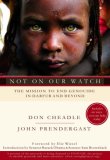Summary | Excerpt | Reviews | Beyond the Book | Readalikes | Genres & Themes | Author Bio

 Book Reviewed by:
Book Reviewed by:
BookBrowse Review Team
Buy This Book
How the world responds to genocide and other mass atrocity crimes represents one of the greatest moral tests of our lifetime. In the face of genocide halfway around the globe, can American citizens—acting individually and in groups—possibly aid in stopping these atrocities?
Absolutely!
We continue to be convinced that the growing chorus of outrage, from Florida to California, can stop war crimes and reduce the cries of agony in places such as Darfur. The U.S. government can take a leading role in stopping atrocities, in most cases without putting U.S. forces on the ground in large numbers. However, the only means by which U.S. policy can change, and thus the only way mass atrocity crimes can end, is if U.S. citizens raise their voices loud enough to get the attention of the White House and force our government to change its policy.
To encourage and embolden you, our readers, to join in this movement to bring an end to genocide around the world, we offer Six Strategies for Effective Change that you as an individual can employ to influence public policy and help save hundreds of thousands of lives:
Ultimately, this book is about giving meaning to Never again. In short, this is a handbook for everyone who thinks that one person cannot make a difference, for those who feel that what happens half a world away is not their responsibility, and for everyone who cares but doesn’t know where to start making a positive difference.
We want to tell that story.
First, though, in the interest of full disclosure and since it is, after all, our book, we will tell you our stories....
*Paul was the manager of a hotel in Rwanda’s capital, Kigali. In 1994, an extremist government set in motion a plan to exterminate Rwandans who were ethnically Tutsi and non-Tutsis who sympathized with them. Paul was a member of Rwanda’s other main ethnic group, the Hutu. When genocide consumed Rwanda in 1994, Paul protected more than one thousand Rwandans from near certain extermination at the hands of extremist Hutu militias. Hotel Rwanda tells his courageous story.
†Throughout this book, we will use the phrases crimes against humanity and mass atrocity crimes interchangeably, treating genocide as one particular extreme manifestation of such crimes. Whether the crimes against humanity committed in Darfur should be regarded as genocide has been the subject of some debate. A United Nations Commission of Inquiry and several reputable research and advocacy organizations—including the International Crisis Group, Human Rights Watch, and Amnesty International—do not use this description. They have a number of good arguments, perhaps best summed up by Gareth Evans, the President and CEO of the International Crisis Group and member of the UN Advisory Panel on Genocide Prevention, who argues that, here, as in a number of other cases, use of the term genocide can be unproductive, non-productive, and even counter-productive. Unproductive, because there are always lawyers’ arguments about whether the legal definition in the UN Convention on the Prevention and Punishment of the Crime of Genocide has been satisfied, and this can be a real distraction from the immediate imperative of protecting the victims of what everyone agrees are crimes against humanity. (The Convention definition requires that certain acts be “committed with intent to destroy,
in whole or in part, a national, ethnical, racial, or religious group,” and it is extremely hard to establish that element of specific intent to destroy non-Arab groups in Darfur.) Non-productive, because, as the U.S. response to Darfur illustrates, even when the term is invoked there is no legal obigation under the genocide convention for countries that use the term to actually do anything. And counterproductive when expectations are raised that a particular situation is genocide, but then lawyers’ arguments prevail that some necessary element is missing, as was the case with the UN commission in Darfur: in these circumstances the perpetrators of what are unquestionably mass atrocities or crimes against humanity achieve an utterly unearned propaganda victory. All of this demonstrates that right-thinking people can disagree about the use of the term genocide. What we and these organizations all totally agree on, however, is that mass atrocities are being committed inDarfur, as well as in the Congo and northern Uganda, and were being committed in the 1990s in southern Sudan, Liberia, Sierra Leone, Angola, and Burundi. In those last five countries, international and local efforts have combined to being about an end to the atrocities and the wars that generated them, giving all of us hope that horrors in Darfur, northern Uganda, Congo, and Somalia can also soon be ended, and future catastrophes prevented.
Excerpted from NOT ON OUR WATCH by Don Cheadle and John Prendergast. Copyright 2007 Don Cheadle and John Prendergast. All rights reserved. Published by Hyperion. Available wherever books are sold.





The House on Biscayne Bay
by Chanel Cleeton
As death stalks a gothic mansion in Miami, the lives of two women intertwine as the past and present collide.

The Flower Sisters
by Michelle Collins Anderson
From the new Fannie Flagg of the Ozarks, a richly-woven story of family, forgiveness, and reinvention.

The Funeral Cryer by Wenyan Lu
Debut novelist Wenyan Lu brings us this witty yet profound story about one woman's midlife reawakening in contemporary rural China.
Your guide toexceptional books
BookBrowse seeks out and recommends the best in contemporary fiction and nonfiction—books that not only engage and entertain but also deepen our understanding of ourselves and the world around us.